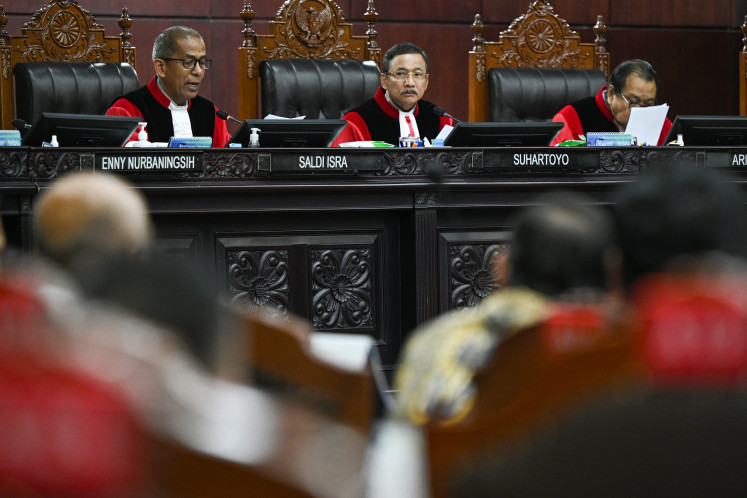Popular Reads
Top Results
Can't find what you're looking for?
View all search resultsPopular Reads
Top Results
Can't find what you're looking for?
View all search resultsLessons learned at the SCS workshop process (Part 1 of 3)
The informal workshop on the South China Sea was not intended to solve territorial disputes among the various claimants, but rather aimed at achieving three things: first, devising cooperative programs that include all participants; second, promoting dialog among the directly interested parties so they can find solutions to their problems; and third, to develop a confidence-building process so everyone can feel comfortable with each other
Change text size
Gift Premium Articles
to Anyone
T
he informal workshop on the South China Sea was not intended to solve territorial disputes among the various claimants, but rather aimed at achieving three things: first, devising cooperative programs that include all participants; second, promoting dialog among the directly interested parties so they can find solutions to their problems; and third, to develop a confidence-building process so everyone can feel comfortable with each other.
Experiences in South China Sea issues indicate that technical cooperation is relatively easier to achieve than resource distribution and more difficult with regard to the territorial, sovereignty and jurisdictional issues. With regard to promotion and cooperation, for instance, it has been agreed on to work out a number of cooperative engagements, and some of them have been implemented such as the bio-diversity expedition. Others are in the process of being implemented such as monitoring rising sea levels and the environment. Also, the training programs for the Southeast Asian Network of Education and Training are also being jointly implemented by Chinese Taipei (2010) and China (2011), paid for by each of them and participated in by all South China Sea parties.
With regard to promoting dialog between the parties, China and Vietnam have been able to agree on maritime delimitation in the Gulf of Tonkin (Beibu) and, in some instances, joint cooperation on fisheries in the area. Vietnam and Indonesia have also agreed to delimit their respective continental shelves in the southern part of the South China Sea, north of Natuna.
To promote confidence building, ASEAN and China have agreed on a declaration of conduct with China. The Philippines has also agreed to codes of conduct with China and Vietnam. In the past, there has also been an understood restriction on occupying new features or increasing military presence in the South China Sea.
A number of lessons have been learned from managing potential or actual conflicts in the South China Sea. Some of these lessons learned may also be useful to other regions. Some of these lessons may be repetitious with other cases, but that may indicate their relevance in managing potential conflicts.
There are other forums that have dealt with the South China Sea issues such as the ASEAN-China dialogue and the informal discussion in the ASEAN Regional Forum and the Council for Security Cooperation in the Asia Pacific. However, participants of the South China Sea Workshop (SCSW) Process have agreed that the process should continue and should be supported by all the coastal states or authorities of the South China Sea.
Some lessons that I have learned from 20 years of managing the SCSW Process are:
The disputing parties must realize that conflict outbreaks — especially armed conflicts — will not settle the disputes and will not benefit any party. In fact, it may only bring mutual damage or loss.
Political will exists to settle the disputes peacefully and to take measures so keep the disputes from escalating into armed conflict. The parties must realize that solving the disputes is more in their interests than prolonging them.
The parties should not legislate any territorial claims and should involve public opinion as little as possible – especially in the areas where the claims are disputed. Legislating territorial claims and seeking support through public opinion tends to harden positions on all sides, making solutions, compromises or even temporary solutions such as joint developments more difficult.
There is a great need to increase transparency in national policy, legislation and documentation and hold more frequent meetings — formal or informal — among the legal officers of the involved countries to exchange their documentation and information and their legislative planning. Successful efforts often begin with informal efforts, either through track two processes or through informal, track one processes. After those efforts indicate possible success, a more formal track one approach can be attempted.
Preventive diplomacy should be undertaken by all parties that have interests in solving the problems, either regionally or internationally. Solutions that account for only national or regional interests and ignore the interests of states outside the region would not be effective, long-term solutions.
Prof. Dr. Hasyim Djalal represents Indonesia at several UN conferences on maritime law. He has been an Ambassador in Ottawa and Bonn. This article is based on his presentation at the “Conference on Joint Development and the South China Sea”, hosted by the Singapore Center for International Law.










